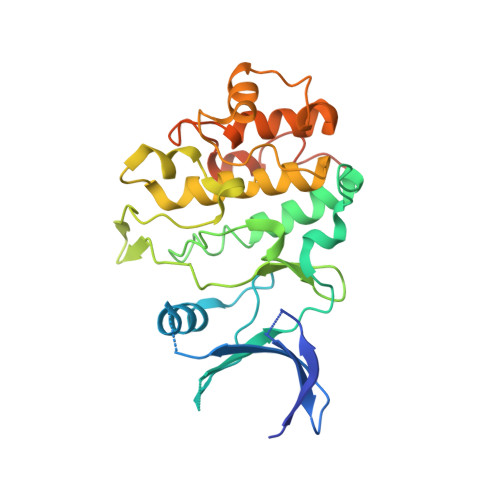Identification of Inhibitors of Checkpoint Kinase 1 Through Template Screening.
Matthews, T.P., Klair, S., Burns, S., Boxall, K., Cherry, M., Fisher, M., Westwood, I.M., Walton, M.I., Mchardy, T., Cheung, K.-M.J., Van Montfort, R., Williams, D., Aherne, G.W., Garrett, M.D., Reader, J., Collins, I.(2009) J Med Chem 52: 4810
- PubMed: 19572549
- DOI: https://doi.org/10.1021/jm900314j
- Primary Citation of Related Structures:
2WMQ, 2WMR, 2WMS, 2WMT, 2WMU, 2WMV, 2WMW, 2WMX - PubMed Abstract:
Checkpoint kinase 1 (CHK1) is an oncology target of significant current interest. Inhibition of CHK1 abrogates DNA damage-induced cell cycle checkpoints and sensitizes p53 deficient cancer cells to genotoxic therapies. Using template screening, a fragment-based approach to small molecule hit generation, we have identified multiple CHK1 inhibitor scaffolds suitable for further optimization. The sequential combination of in silico low molecular weight template selection, a high concentration biochemical assay and hit validation through protein-ligand X-ray crystallography provided 13 template hits from an initial in silico screening library of ca. 15000 compounds. The use of appropriate counter-screening to rule out nonspecific aggregation by test compounds was essential for optimum performance of the high concentration bioassay. One low molecular weight, weakly active purine template hit was progressed by iterative structure-based design to give submicromolar pyrazolopyridines with good ligand efficiency and appropriate CHK1-mediated cellular activity in HT29 colon cancer cells.
- Cancer Research UK Centre for Cancer Therapeutics, The Institute of Cancer Research, 15 Cotswold Road, Sutton, Surrey SM2 5NG, UK.
Organizational Affiliation:

















